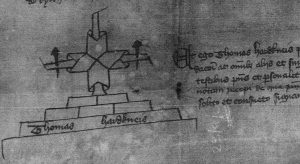Records occur of the names Herknes and Hardkneis, both public figures, living in the same community, Peebles, only a few miles from the Pentland Hills.
On 26th July 1434 an Instrument of Sasine (transfer of land) was drawn up by Thomas Hardkneys, Notary Public. The transaction concerns transfer of land associated with the Skirling Estate, Peebleshire.
The document is in latin and is confirmed with the unique notary seal of Thomas Hardkneys
It is interesting that the National Archive Record GD89/1/314 records in the summary of the document “Thomas Harkness”.
The following are to be found in the ‘Calendar of Writs Preserved at Yester House 1166 – 1625’ (Scottish Records Society. 1930).
- On 12th April 1447, John Herknes, chaplain at Pebyllis, was a witness to a charter whereby a Scottish noble, Sir David de Haye, donated, “for the safety of his soul”, one acre of ground to the Vicar of Stobo (Stobo Kirk still exists a few miles from Peebles). (Entry 84).
- On 26th November 1448, Thomas Hardkneis, notary, witnessed a charter again involving Sir David Haye. The document was dated at the Castle of Jedburgh in the Scottish Borders, but there are clear connections with Peebles. One of the other witnesses being the “Dean of Christianity of Peblis”, and David Haye was sheriff of Peebles about this time. (Entry 89)
In the records of the ‘Charters Relating to the Burgh of Peebles’ on the 20th April 1448 “Master John Wach and Sir Thomas Hardkneis, notaries of public” witnessed a charter in which Sir John Blounte, Rector of Lyne, gifted a building to the town of Peebles.
In 15th century Scotland a Notary Public was usually, but not always, a priest of the Roman Catholic Church who was trained in the law. Before a transaction such as transfer of property or land was considered legal it had to be recorded and verified by a Notary who appended his own unique seal, at that time hand drawn, to the document. The seal of Thomas Hardkness which includes a representation of a cross might suggest that he was a priest. At that time it is unclear whether a priest could be married.

